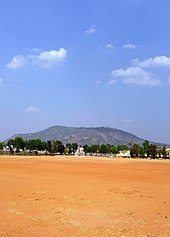Chamundi Hills
This article needs additional citations for verification. (January 2019) |

The Chamundi Hills are located 13 km east of Mysore, the Palace City, in Karnataka, India. The average elevation is 1,000 metres (3,300 ft).
Attractions

The Chamundeshwari Temple is located atop the Chamundi Hills. Patronised for centuries by Mysore rulers, it was renovated during the time of Krishnaraja Wodeyar III (1827).
Temple


Named after the goddess Chamundi, the Chamundeshwari Temple sits atop the main hill. The main hill itself features an ancient stone stairway of 1,008 steps leading to its summit. Approximately halfway to the summit is statue of bull Nandi, the vahana, or "vehicle" of Lord Shiva, which is 4.9 m tall and 7.6 m long and carved out of a single piece of black granite. Around this point, the steps become significantly less steep and eventually the climber is rewarded with a panoramic view of the city.
The Temple has a quadrangular structure. A key feature is the statue of Mahishasura bearing a sword in his right hand and a cobra in the left. Within the temple's sanctum stands a sculpted depiction of Chamundeshwari. She is seated with her right heel pressed against the lowest of the seven chakras. This cross-legged yogic posture echoes the posture of Lord Shiva. Worshipers believe that this powerful yogic posture, if mastered, provides an added dimensional view of the universe.
Since the early days of the Maharajahs of Mysore, the idol of goddess Chamundi has been carried on a decorated elephant as part of the celebrations in the annual Dusshera festival.
From the peak of the Chamundi hills, the Mysore Palace, the Karanji Lake and several smaller temples are visible.
Legend
According to a legend, the asura Mahishasura (king of the city that is currently known as Mysore) was killed by goddess Chamundeswari (also called Chamundi) after a fierce battle. The goddess is also called Mahishasura Mardini.[1]
According to mythology, this rocky hill was known as Mahabalachala. Two ancient temples occupy the hill, the Mahabaleshvara and the Chamundeshvari; the Mahabaleshvara Temple on the hill is the older of the two and is a place of pilgrimage. The car festival and 'Teppotsava' are held there.
Influence on the name of Mysuru
The name of Mysuru comes from the old Kannada word "Mahishooru". Mahishooru literally means 'the village of Mahishasura.' The British then modified this name to 'Mysore'. Then, on 1 November 2014, the government of Karnataka changed the name to 'Mysuru'. The hill thus has an indirect influence on the name of the city.
Sadhguru Jaggi Vasudev
Indian yogi Sadhguru claims to have experienced Spiritual Enlightenment in Chamundi Hill. He claims that, when he was about 25 years old, he was sitting on a rock in Chamundi Hill, and there he experienced a life changing experience in which he experienced everything as himself.
